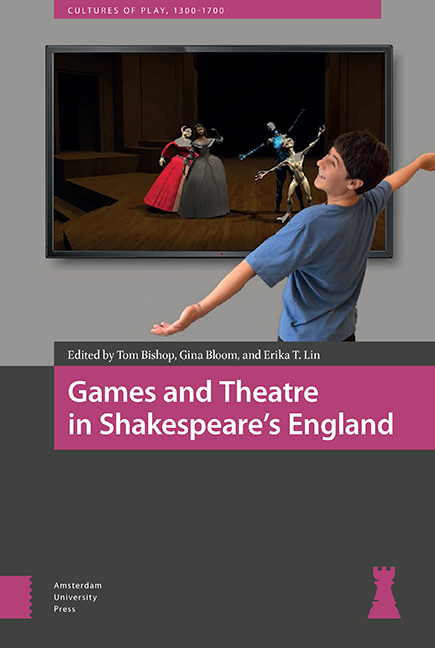4 - “The games afoote”: Playing, Preying and Projecting in Richard Brome's The Court Beggar
Published online by Cambridge University Press: 21 October 2021
Summary
Abstract
This essay examines Richard Brome's The Court Beggar (1640), charting the associative field the play establishes between recreational games, hunting, financial projects, and the theater. Within this field, itself the product of the socio-economic and political environment of the 1630s, predation is never far from the ludic, particularly as it is crystallized in the play's proposal for a “floating Theatre.” This semi-serious, semi-parodic scheme serves as Brome's unique contribution to ways of thinking about London entertainment industries, including the theatre, in the years just before the English Civil War.
Keywords: Brome, Richard; economic projects; water drama; hunting; Caroline drama; metadrama; Second Poets’ War
“The games afoote,” declares Gabriel, the savvy servant of Richard Brome’s The Court Beggar, as he observes three projectors entering the house of his master, Sir Andrew Mendicant. “They hunt in full cry.” Gabriel's observation about the projectors—early modern inventors of varieties of often questionable money-making schemes—is part of the play's comprehensive satire of Mendicant, the eponymous court beggar who has forfeited the perquisites of gentle country life in pursuit of social status in the fashionable West End. Or, as his daughter, Charissa, reminds him, he has exchanged “large fruitfull Fields, rich Medowes and sweet pastures” for a “lodging in the Strand” (N6r). Like Gabriel, Charissa frames this exchange of country for city in the vocabularies of both recreation and those economic enterprises known in the period as projects. Once Mendicant had “a numerous Family/ Of Servants and Attendants, out of whom/ […] you could call/ Your Bayliffe, Groom, your Falconer, or your Huntsman.” He also had “hounds […] that made you sport and Musick.” Now, she tells her father, there are “none but your project beagles, that smell out/ Where such a forfeiture is to be begg’d” (N6r–6v). Mendicant, identified in the dramatis personae of the play's first printed edition (1653) as “an old Knight, turnd a Projector,” has become the projectors’ quarry.
The comic structure of The Court Beggar, performed at the Phoenix, or Cockpit, Theatre in 1640, derives from the hunt, for which “game” was both a synonym (“entertainment derived from the chase […] the sport of hunting and shooting (or otherwise catching or killing) animals, birds, etc.,
- Type
- Chapter
- Information
- Games and Theatre in Shakespeare's England , pp. 115 - 136Publisher: Amsterdam University PressPrint publication year: 2021



